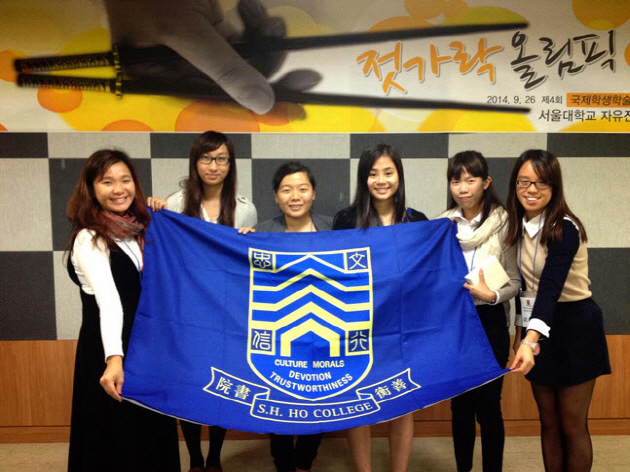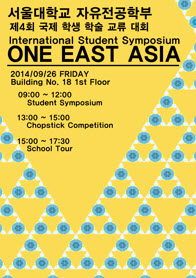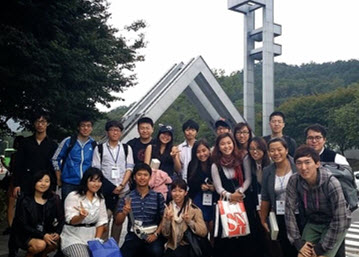
The Universities of China, Japan, Hong Kong, and Korea
Seoul National University’s College of Liberal Studies held the 4th Student Exchange Program-International Symposium from September 25-28 at which the need to strengthen interdisciplinary approaches was manifested among four liberal arts colleges.
Since the first symposium in 2011, the College of Liberal Studies and Peking University’s Yuanpei College have been promoting academic exchange among students based on the two colleges’ shared vision of liberal arts education.
Peking University established Yuanpei College in 2001 as an initiative to reform its undergraduate education by strengthening fundamental studies. Both the College of Liberal Studies and Yuanpei College provide students the opportunity to freely select their majors, a revolutionary system in Asian universities.
This year thirty-seven students from Seoul National University’s College of Liberal Studies, Peking University’s Yuanpei College, Chinese University of Hong Kong’s S.H. Ho College, and newly participating University of Tokyo’s College of Arts and Sciences gathered to present their ideas on the symposium’s main topic of “One Asia.”
The University of Tokyo’s College of Arts and Sciences provides liberal arts education with the aim of nurturing students whose understanding transcends interdisciplinary boundaries.
The Chinese University of Hong Kong’s S.H. Ho College joined the International Symposium in 2013. S.H. Ho College admitted its first students in 2010 under the mission of cultivating culture and morals through general and whole person education.
The four participating colleges from Korea, China, Hong Kong, and Japan all pursue liberal arts education as forerunners of interdisciplinary studies in Asian universities. The exchange among liberal arts colleges in East Asia enabled students with diverse interests and backgrounds to connect their creative ideas of “One Asia.”
College of Liberal Studies 4th International Symposium
The symposium began on Friday. Opening remarks by the Associate Dean of Student Affairs HAN Sung Nim and College of Liberal Studies’ Dean HAN Kyung Goo aroused academic passion and trans-university friendship among the participants.
Without further delay, Yuanpei College students presented first on “High-speed Rail Network: The Potential Foundation of One East Asia,” arguing the feasibility of an underwater and land based rail network connecting China, Korea, and Japan. Such railways will enhance communication among the three nations in other areas too, concluded the team.
 Next, the University of Tokyo’s College of Arts and Sciences’ participants gave interesting insights on “Comparison of University Entrance Exams in Korea, China, Japan,” pointing out problems of each nation’s education system, such as overemphasis on educational qualifications and excessive competition. For the second presentation, “Acceptance of English in East Asia,” the students questioned why English education is almost obligatory in Asian nations and the legitimacy of prioritizing English skills in college and job applications. Discussing their opinions in connection with the concept of linguistic imperialism, the students explained the violent imperialism of English for it deprives other languages of their roles and positions. They proposed teaching Chinese, Japanese, and Korean in English as part of a compromising solution.
Next, the University of Tokyo’s College of Arts and Sciences’ participants gave interesting insights on “Comparison of University Entrance Exams in Korea, China, Japan,” pointing out problems of each nation’s education system, such as overemphasis on educational qualifications and excessive competition. For the second presentation, “Acceptance of English in East Asia,” the students questioned why English education is almost obligatory in Asian nations and the legitimacy of prioritizing English skills in college and job applications. Discussing their opinions in connection with the concept of linguistic imperialism, the students explained the violent imperialism of English for it deprives other languages of their roles and positions. They proposed teaching Chinese, Japanese, and Korean in English as part of a compromising solution.
S.H. Ho College students explored various cultures of Asia in “Cultures and Traditions among Us,” “The Importance of the Intangible Cultural Heritage (ICH) to a Country,” and “Impact on the Countries of the Region: Disputes and the Beneficiaries.” Katrina LEE (CUHK, Journalism and Communications) said that she realized the different motives of nations in valuing culture. For example, China, Japan, and Korea have tendencies to value ICH because of political and economic reasons, while Hong Kong pays less attention to whether culture is placed on the official list of ICH.
The College of Liberal Studies provided a new perspective on the topics of “East Asian Meteorological Cooperation,” “Multi-national Submissions of UNESCO Intangible Heritage,” and “Territorial Disputes in East Asia.” MIZUTANI Kei (University of Tokyo, American Studies) found the research on meteorological cooperation most impressive because it showed a future opportunity for Asia. He realized that cooperation can happen at the municipal level, from city to city, and that Pusan and Fukuoka are so close that they share similar climates. In innumerable ways, the diverse set of topics, including politically sensitive ones, contributed to consolidating a peaceful and honest vision of “One Asia.”
Ellen TSANG (CUHK, Accountancy) stated that the best part of the program was the symposium itself. “We needed to prepare for the symposium beforehand so we did the research and participated in the discussions more actively. I liked that there were very diverse topics on culture, politics, and economics. It also makes me happy that all students have a positive position on Asia’s cooperation.” She especially learned the most from ideas on the transnational rail network and meteorological cooperation, which made her wonder why a regional Asian organization, something like the European Union, is not able to take form in Asia.
Following the presentations, participants divided into three groups to discuss in depth the presented topics.
“Chopstick Olympics”
The Chopstick Olympics, held after the discussions, provided the participants with a fresh perspective on an everyday utensil.
The purpose of the game was to rediscover the meaning of chopsticks as a commonly shared cultural heritage in Hong Kong, China, Japan, and Korea.
First, the participants were divided into teams of four people. They were asked to select the order of their team, the type of chopsticks they would be using, and three kinds of different objects to pick up and transfer using the selected chopsticks. A gamut of chopsticks from stainless metal to long wooden ones and a variety of materials from black beans, red beans to baduk stones tested the chopstick skills of the players.
Learning through Experience: Cultural Tours
In addition to academic exchange, the students engaged in cultural activities.
On the first day, a warm welcoming dinner served the guests traditional Korean bibimbap and roasted kalbi. Afterwards, the Chinese and Japanese students had the chance to experience Korea’s unique drinking culture of enjoying fried chicken with beer (chimek).
One student asked if it was a Korean tradition to eat fried chicken with beer on first days of snow as she saw on the Korean drama “My Love from the Stars.” It did not take long for students to open up to one another as discussions about the competitiveness of entering university, personal travel experiences and future job plans filled the on-campus bar over the sound of “Jjan (Cheers)!”
After the end of all formal events, the Korean students provided a tour around Seoul National University and a cultural tour of Seoul on the final day.
Visions for One Asia
 The International Symposium provided an opportunity for students of liberal arts colleges to exchange perspectives on the future of “One Asia.”
The International Symposium provided an opportunity for students of liberal arts colleges to exchange perspectives on the future of “One Asia.”
While sharing a deep understanding of liberal arts, each participant’s distinct field of study truly engendered lively conversations and friendship.
OTANI Yoshito (University of Tokyo, Comparative Arts) believes that “rather than relying on the media, more Asian people should communicate with each other face to face.”
XIA Erfan (Peking University, Philosophy, Politics and Economics) emphasized that if we can put controversy behind us, some real cooperation on certain issues is feasible. With confidence he acknowledged, “We are here as a group and this is the hope for One Asia.”
Written by BAE Su Hyen, SNU English Editor, suhyenbae@snu.ac.kr
Reviewed by Eli Park Sorensen, SNU Professor of Liberal Studies, eps7257@snu.ac.kr
Proofread by Melora Brett Briana Johnson, morningcalm2@gmail.com

